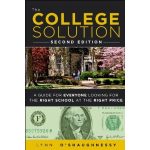Are you stressed about all your children’s college choices?
Plenty of parents are. And it’s not surprising when you consider that there are roughly 2,700 four-year colleges and universities in the U.S. The littlest ones have less than 100 students while the biggest state school nearly equals the population of Santa Fe, NM.
A TED Talk on Choice
With the latest college admission season about to take off, I’ve started getting emails from parents of high school seniors who are frazzled by their options. Their dilemma reminded me of a portion of a TED talk that I heard via NPR’s TED Radio Hour that focused on people’s reactions to bountiful choices.
The TED talk speaker was Barry Schwartz, a psychology professor at Swarthmore College, who noted in his presentation that it’s a dogma of western society that the more choices people have, the more freedom they enjoy and the more prosperity that they experience.
The choices that all of us encounter every day in big and small ways can be intimidating. Schwartz, for instance, noted that his grocery store carries 175 different types of salad dressing. At his consumer electronics store, he calculated that a shopper could end up buying one of 6.5 million different configurations of stereo systems.
The Downside to All this Choice
Schwartz says all this choice imposes two negative effects. One effect is that it can produce paralysis rather than liberation. With so many options, whether it’s college or toothpaste, it’s difficult to choose at all. A famous study involving 401(k) plans, for instance, showed that the more mutual fund choices that a retirement plan contained, the fewer people participated. The task of choosing was just too overwhelming so workers postponed making any decisions.
Of course with college, you can’t delay drawing up a college list indefinitely, but I do think that the choice issue keeps many families from seriously focusing on college (as opposed to just fretting) until the fall of their teenager’s senior year in high school.
The second consequence of copious choices, according to Schwartz, is that we end up less satisfied with the choices we ultimately make. This is true even when we have picked wisely. That’s because we aim for perfection. If we are going to pay big bucks for a school, we expect it to be perfect.
How to Handle All Those Choices
While choice doesn’t lead to happiness, modest, realistic expectations can, Schwartz suggested. This is going to be hard to accept for Americans who now expect everything to be perfect.
Rather than look for the perfect school for your child, look for good schools that will provide a good education. And that means that you don’t have to include a universe of 2,700 or even 100 schools. Forget about finding that illusive perfect school because if you do you are more likely to become paralyzed rather than happy.
Lynn O’Shaughnessy is the author of the second edition of The College Solution: A Guide for Everyone Looking for the Right School at the Right Price.
